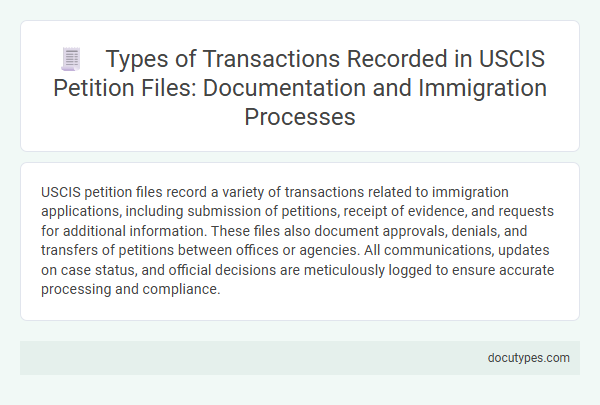USCIS petition files record a variety of transactions related to immigration applications, including submission of petitions, receipt of evidence, and requests for additional information. These files also document approvals, denials, and transfers of petitions between offices or agencies. All communications, updates on case status, and official decisions are meticulously logged to ensure accurate processing and compliance.
Overview of USCIS Petition File Transactions
USCIS petition files contain detailed records of all transactions related to your immigration case. These transactions document each step taken from application submission to final adjudication.
- Application Submission - Records initial receipt and filing of the immigration petition or application.
- Fee Payments - Documents all payments made, including filing fees and biometric services fees.
- Status Updates - Tracks changes and progress such as requests for evidence, approvals, or denials.
Common Documentation Types in Petition Files
USCIS petition files contain a variety of transactions related to immigration applications and petitions. These files serve as comprehensive records that document the processing history and supporting evidence for each case.
- Form Submissions - Copies of forms such as I-130, I-485, and I-140 submitted by applicants or petitioners are included to establish the basis of the immigration request.
- Supporting Evidence - Documents like birth certificates, marriage certificates, employment letters, and financial affidavits are recorded to verify eligibility and petition legitimacy.
- Correspondence Records - Notices, requests for evidence, receipts, and approval or denial letters reflect communication between USCIS and the petitioner or applicant throughout the adjudication process.
Application Submission Records
The USCIS petition files include detailed records of your application submissions, capturing essential transaction types such as form filings, supporting document attachments, and payment confirmations. These records provide a comprehensive timeline of your immigration petition process.
Application submission records specifically document when USCIS receives your petition or application, encompassing various forms like I-130, I-485, and N-400. Each submission entry includes timestamps, receipt numbers, and details of any accompanying fees paid. This data ensures accurate tracking and helps verify the status of your immigration request throughout processing.
Evidence and Supporting Document Files
USCIS petition files contain various types of evidence and supporting documents critical to the immigration process. These files include identity proofs, financial statements, employment letters, and affidavits submitted to establish eligibility for immigration benefits.
Additional supporting documents may consist of medical records, birth certificates, marriage certificates, and any other documentation that verifies the petitioner's claims. The thorough compilation of these files ensures USCIS can accurately assess the legitimacy and qualifications of each petition.
Requests for Evidence (RFE) Documentation
USCIS petition files contain various transaction types documenting the petition process, including initial submissions, notices of action, and Requests for Evidence (RFE). RFEs are formal requests issued by USCIS officers when additional information or documentation is needed to make a determination. These requests ensure thorough evaluation of eligibility by capturing missing or incomplete evidence related to the immigration petition.
Interview and Biometric Appointment Notices
What types of transactions are recorded in USCIS petition files regarding interview and biometric appointment notices? USCIS petition files document the scheduling and completion of interview appointments to verify applicant eligibility. They also include biometric appointment notices where applicants provide fingerprints, photographs, and signatures for background checks.
Approval and Denial Notice Records
USCIS petition files document various transaction records related to immigration case processing. Approval and denial notices are critical components that reflect the outcome of each petition.
- Approval Notices - These documents confirm the successful acceptance of a petition and authorize the requested immigration benefit.
- Denial Notices - These records indicate the rejection of a petition, including the reasons for denial and applicable appeal instructions.
- Transaction Dates - Each approval or denial notice is timestamped, providing an official record of when the decision was made.
These records ensure transparency and legal documentation of the petition adjudication process by USCIS.
Correspondence and Communication Logs
| Type of Transaction | Description |
|---|---|
| Correspondence | Includes all written communications between the petitioner, beneficiary, and USCIS. This covers letters, notices, and requests for evidence related to the immigration petition. |
| Communication Logs | Records of phone calls, emails, and in-person communications documented by USCIS officers or petitioners. These logs track inquiry dates, subjects discussed, and responses provided during the petition process. |
Withdrawal and Abandonment Transaction Records
USCIS petition files document various transaction types, such as approvals, denials, withdrawals, and abandonments. Withdrawal and abandonment records specifically indicate when a petitioner or applicant decides to stop the process.
Withdrawal transactions occur when your petition is formally retracted before adjudication. Abandonment is recorded when USCIS determines that the petition was not actively pursued or responded to within required time frames.
What Types of Transactions Are Recorded in USCIS Petition Files? Infographic

